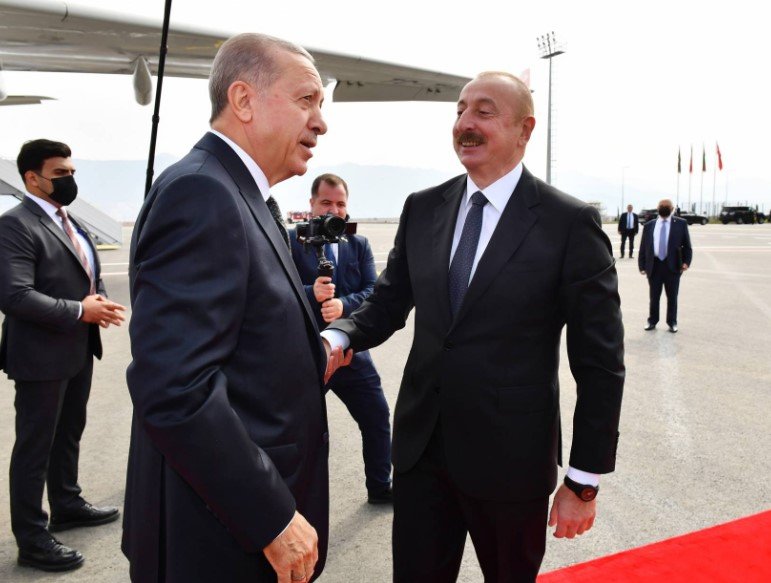Kavelashvili’s visit marks a symbolic and strategic moment for the Caucasus neighbors amid regional energy, trade, and security shifts
On April 15, Georgia’s President Mikheil Kavelashvili touched down in Baku for an official visit to Azerbaijan. It’s his first since taking office, and the reception was nothing short of diplomatic theater — red carpet, national flags fluttering, and a guard of honor waiting at Heydar Aliyev International Airport.
He was welcomed by top Azerbaijani officials including First Deputy Prime Minister Yagub Eyyubov and Deputy Foreign Minister Yalchin Rafiyev. It wasn’t just for show. This trip carries weight.
A Visit Rooted in Regional Calculations
This isn’t just a handshake-and-smile moment. Kavelashvili’s visit lands at a time when the South Caucasus is at a geopolitical crossroads.
Georgia and Azerbaijan, long seen as anchor points between Europe and Asia, have increasingly found themselves balancing regional cooperation with global pressure. Trade routes, energy pipelines, and defense dialogues all flow through this corridor.
For Tbilisi, deepening ties with Baku makes strategic sense. Azerbaijan is a key energy partner and one of Georgia’s largest trading allies. More importantly, both nations have vested interests in stability — especially with conflict-prone neighbors and shifting alliances around them.

Kavelashvili’s arrival wasn’t just about ceremonial greetings. It marked a deliberate message of continuity and cooperation.
What’s Likely on the Table
While official statements remain guarded, political insiders and regional analysts suggest several key issues likely dominated early discussions.
One-line paragraph here for effect: Energy, connectivity, and security — those are the big three.
Let’s break it down a bit:
-
Energy cooperation: Expect updates on the Southern Gas Corridor and Baku-Tbilisi-Ceyhan pipeline arrangements.
-
Infrastructure: Talks likely touch on the Baku–Tbilisi–Kars railway and broader corridor connectivity through the Black Sea.
-
Security: With lingering tensions in the broader region, including Armenia-Azerbaijan issues and the shadow of Russian influence, coordination between Tbilisi and Baku is crucial.
Cultural diplomacy and education exchanges may get airtime too, but the heavy-lifting is happening in the economic and strategic realms.
Why This Visit Matters Right Now
This isn’t a one-off trip or diplomatic checkbox. It’s happening against a backdrop of important regional developments.
There’s been rising interest from the EU and U.S. in the Caucasus, mostly to curb Russian sway and tap into alternative energy corridors. Georgia, situated on NATO’s doorstep but not inside the alliance, needs all the regional goodwill it can get.
And Azerbaijan? With its gas exports gaining global traction post-Ukraine war disruptions, Baku wants reliable transport partners. Georgia fits the bill.
Kavelashvili’s visit arrives at a moment when aligning more closely with Baku could yield long-term gains.
Short one-line sentence here: Timing is everything in politics — and this trip is well-timed.
Symbolism, Pageantry, and Political Signals
Let’s not forget the optics. The grand airport welcome — with flags waving and brass buttons gleaming — was part show, part signal.
Georgia wants the world to see this relationship as warm, stable, and essential. Baku, too, is playing host with deliberate fanfare, showcasing its regional status.
There’s also something quietly powerful about who met the president at the tarmac. Having the First Deputy Prime Minister and Deputy Foreign Minister personally welcome Kavelashvili sends a message: this isn’t business-as-usual.
It’s a calibrated move in a region where subtle gestures often carry as much weight as official communiqués.
Trade and Transit Corridor Talks Could Pick Up Pace
Trade routes are the lifeblood of Georgia and Azerbaijan’s cooperation.
Georgia serves as a key gateway for Azerbaijan’s energy exports westward. With global demand for alternatives to Russian gas still high, these transit lines are more valuable than ever.
Let’s take a look at current corridor activity:
| Corridor Name | Function | Status (2025) | Involves Georgia? |
|---|---|---|---|
| Southern Gas Corridor | Gas transit to Europe | Active, expanding | Yes |
| Baku-Tbilisi-Ceyhan Pipeline | Oil transport to Turkey | Fully operational | Yes |
| Baku–Tbilisi–Kars Railway | Freight & passenger rail | Limited service, upgrades planned | Yes |
| Middle Corridor (China-EU) | Multimodal trade route | Under development | Yes |
This table highlights just how central Georgia is to Azerbaijan’s trade ambitions — and vice versa.
More deals on these lines could quietly be in the works during this visit.
What’s Next for the Two Neighbors?
It’s likely that both sides will release joint statements or sign fresh MOUs before the trip wraps. If they do, expect them to emphasize partnership, peace, and economic potential.
For President Kavelashvili, this is more than a diplomatic debut — it’s a chance to show Georgia’s role as a reliable regional actor.
And for Azerbaijan, playing host under the global spotlight reinforces its image as a regional heavyweight.
The underlying tone? Forward-looking but cautious. Both countries understand the stakes. Cooperation is no longer optional — it’s vital.
